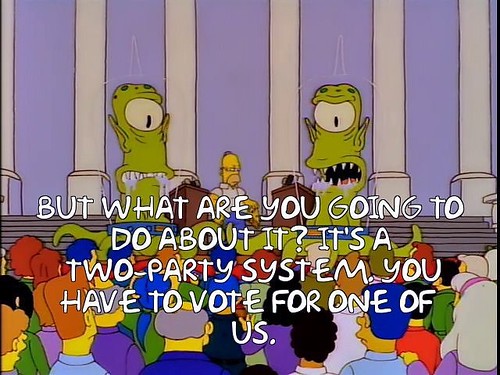Abolishing the Party System

October 23, 2020
Even though the political party system has been in place for nearly 230 years, abolishing it has become a 21st century topic of debate. Politics of this age can be sloppy and radical. With neither side willing to compromise, you are either on one side or the other.
The system implemented in America today has both negative and positive effects. The party system makes it easier to vote without spending much time catching up on the morals of the candidates. If the policies are obvious because of the party each candidate is part of, then why pay any attention to the person standing behind the policies? While this could be viewed as a benefit of the party system, many remain uneducated on the person they are trying to put in office. They know nothing about the morals of the person; only of the policies. This issue cannot be blamed solely on the party system, but also can be blamed on the unwillingness of the American people to educate themselves on matters that may not affect them personally.
SA Junior Sarah Sullivan realizes that there are benefits to abolishing the party system.
“Many people cast their votes based on party association alone,” Sullivan says. “If the system is abolished, people will spend much more time learning about candidates rather than just their policies.”
The party system has been in place since the late 1700s. With the permanency of it, it would be incredibly difficult to change a system that has been in place for nearly 230 years.
SA Junior PJ Bryson believes that it would be nearly impossible to abolish the party system.
“The system cannot be abolished,” Bryson said. “Most opinions can be categorized into main parties. Most US citizens have an ‘either-or’ mindset which will in turn lead to two parties.”
This either-or mindset was foreseen by the founding fathers who warned against the effects of a party system. In his farewell address, Washington said, “The alternate domination of one faction over another, sharpened by the spirit of revenge, natural to party dissension, which in different ages and countries has perpetrated the most horrid enormities, is itself a frightful despotism.”
Washington’s theory was that if a consistent partisan majority was united to take control of the government, it would use its power to oppress the minority. The consent of the governed would decay and authoritarianism may follow. Because of Washington’s statements, it is now being argued that the party system may, in fact, be unconstitutional.
Challenging the years old system will most likely prove to be a difficult battle, but some have already offered solutions to the seemingly flawed system.
Lee Drutman, author of the book Breaking the Two-Party Doom Loop: The Case for Multiparty Democracy in America, offers a solution: America must replace the double party system with a multiparty enterprise by implementing ranked-choice voting. Drutman based his solution on the postwar government style of the European democracy, which he believes to be the superior system. The voting method currently in place would be transformed into a multiparty system. Voters would have more than just two viable options. Drutman even addresses the divide that the party system has caused between American citizens.
Uprooting the major foundation that America was built on would surely cause uproar and protests. No one truly knows enough about American politics to predict what might happen if the system is changed or adjusted. America has undergone many waves of political reform in its history. The disconnect of the Americans from each other suggests that this may be the beginning of another reformation. The polarization of America is a true issue that we, as a people, must come together to fix.


